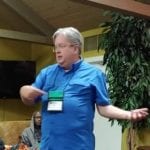The death of Bishop John Shelby Spong brought up the suspected accolades and condemnations from the expected quarters. It was all predictable. The Church is as polarized as the rest of society. It is a great tragedy. But the tragedy would be worse if the church was a monolithic entity lacking intellect and wisdom that ran down a cliff into the sea. Christianity would never have survived the Enlightenment if it had been. Bishop Spong tried to revive the Church by bringing it in line the vitality of the Enlightenment. He was not the first to try. But he may be the last public Pastor to do so.
Bishop Spong as Rescuer
My first encounter with Bishop Spong’s writing was Rescuing the Bible from Fundamentalism. Like many other younger clergy with my background, I considered him as making good points but going too far. I secretly like authors with whom I can argue. He kept me engaged. I never met him and never heard him speak. I can’t say I knew him. But I know the project he worked on. Harry Emerson Fosdick’s sermon, “Shall the Fundamentalists Win?” was an earlier work of the project. Unwittingly, it exposed the problem of the project.
The central problem of the Liberal Christian project is the understanding that involves a competition. Fundamentalism fails at that very point. Intellectual movements and anti-intellectual movements are not in competition. There is no contest when both sides do not play by the same rules. Anti-intellectualism by it’s nature cannot argue logically or analyze data without an ideology.
Spong did what everyone eventually does. He stopped arguing against bad ideology and decided to argue for a bold vision of the future of Christian faith. He was a particularly American Bishop who whether he knew it or not relied heavily on the spirit of American pragmatism in the tradition of William James and Richard Rorty.
Liberalism and Morality
I argue Bishop Spong was neither theologian nor biblical scholar. He was a moral philosopher. How people think informs how they act. Critics have pointed out that a decline in numbers in Mainline churches indicates a death due to theological liberalism. The question is, “if people are leaving, where are they going?” Conservative critics claim people are going to places that are conservative. Oddly enough, the conservative critics within mainline churches don’t go with them.
A good nerd like me knows Star Trek was canceled before ratings were analyzed demographically. The content of the series appealed to a smaller but more engaged group of people. Here is where the issue of thought informing moral action is involved. If people walk away because churches do not appeal to their prejudices, is that a bad thing? Anti-intellectualism never produces moral activity. Racism, homophobia, sexism, and classism are not intellectually defensible positions. It does not matter how many appeals a person makes to “biblical authority” only biblical illiteracy allows a person to keep such prejudice.
A friend observes, “all clergy preach more conservative than they are.” May Sarton claimed in one of her journals “clergy tend to be more liberal than their congregations. It brings us to the crisis of liberal clergy.
The Crisis of Liberal Clergy and Bishop Spong
Pastors know they tread dangerous ground in most traditional churches. Bishop Spong knew this. He knew liberal clergy were uncomfortable with teaching the things they learned in their seminaries. But Bishop Spong was also a Pastor. Leading in religious communities has peculiar challenges in any era especially in the consumerist one. He decided to lead and not look back to see who or if anyone was following. There were many of us that did or were at least willing to listen. It is not my style of leadership. I admit to wishing it was sometimes. I was a little jealous.
The crisis for liberal/progressive/liberationist clergy is in how we lead our communities. Do we lead without looking back? I wish I could. My leadership style is that of the Algebra teacher who had to deal with me in class. I never really wanted the instruction but knew I needed it. My style of leadership is to say “come along if you are willing.” But I can’t tell other clergy how to managed the consumerist church.
The one important need Bishop Spong pointed out that clergy people should have is to find a vision of the future for Christian people. I have that vision after years of seeking it. Thank you, Bishop Spong for that help and that challenge.












